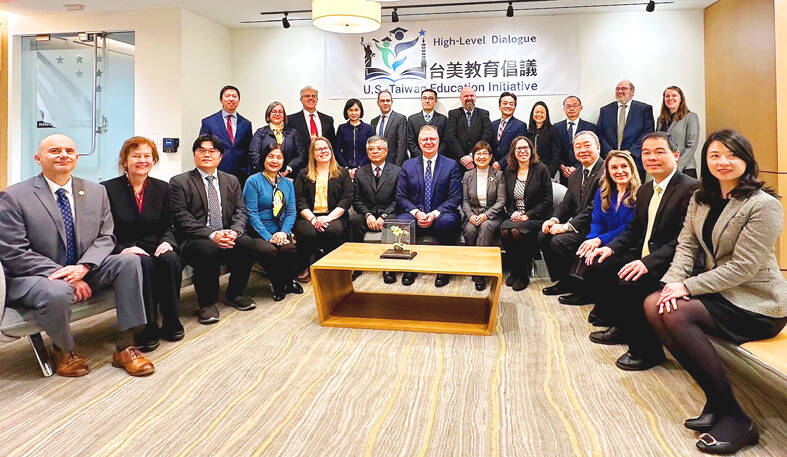Taiwan and the US on Monday reaffirmed their commitment to deepening cooperation in English and Mandarin-language education, with a view to expanding their collaboration to include the sciences.
Deputy Minister of Education Liu Mon-chi (劉孟奇) led a delegation of ministry officials to the fourth high-level dialogue under the Taiwan-US Education Initiative in Washington, the Ministry of Education said in a news release yesterday.
The ministry presented the outcome of bilateral cooperation in Mandarin and bilingual education; exchanges between elementary, junior-high schools and universities; and cultivation of semiconductor talent, it said.

Photo courtesy of the Ministry of Education
Significant progress in promoting Mandarin education has been made since the last dialogue in February last year, Liu said.
A record 3,080 US students are to come to Taiwan to study Mandarin this year, while the ministry selected 147 Mandarin-language teachers and teaching assistants to teach in the US, he said.
Taiwan provided subsidies to 20 universities in Taiwan and 56 universities in the US to promote quality Mandarin education under the Huayu Best (台灣優華語計畫) program, he said, adding that four Taiwan Centers for Mandarin Learning were established last year.
The University Academic Alliance in Taiwan, consisting of 12 universities in Taiwan, has signed memorandums of understanding with three US university systems for cooperation in the fields of semiconductors, engineering sciences and Mandarin-language education, he said.
Thanking the US government for continuing to support bilingual education in Taiwan by sending professional English teachers, the ministry said it hoped that the two nations could extend the cooperation to cover STEM — science, technology, engineering and mathematics — education in elementary and junior-high schools.
Also present at the meeting were National Security Council Deputy Secretary-General Hsu Szu-chien (徐斯儉), who joined online, Overseas Community Affairs Council Minister Hsu Chia-ching (徐佳青) and Representative to the US Alexander Yui (俞大?).
On the US side, attendees included US Assistant Secretary of State for East Asian and Pacific Affairs Daniel Kritenbrink, US Deputy Assistant Secretary of State for East Asian and Pacific Affairs Camille Dawson, American Institute in Taiwan (AIT) Chairwoman Laura Rosenberger and AIT Managing Director for the Washington office Ingrid Larson.
After the meeting, the delegation visited the University of Maryland, a partner in the Huayu Best Program, to discuss with university president Darryll Pines plans to provide Mandarin courses focusing on professional fields to US students coming to Taiwan for internships, the ministry said.
The US-Taiwan Education Initiative was launched in 2020 and was expanded last year to allow more young Americans to learn Mandarin in Taiwan, and more Taiwanese Mandarin instructors to teach in the US, the Ministry of Foreign Affairs said yesterday.
Working with the Foundation for Scholarly Exchange (Fulbright Taiwan), the government is promoting the use of English as the medium of instruction for English-language classes in universities and recruiting more English teaching assistants to meet its Bilingual 2030 policy, it said.

A magnitude 5.6 earthquake struck off the coast of Yilan County at 12:37pm today, with clear shaking felt across much of northern Taiwan. There were no immediate reports of damage. The epicenter of the quake was 16.9km east-southeast of Yilan County Hall offshore at a depth of 66.8km, Central Weather Administration (CWA) data showed. The maximum intensity registered at a 4 in Yilan County’s Nanao Township (南澳) on Taiwan’s seven-tier scale. Other parts of Yilan, as well as certain areas of Hualien County, Taipei, New Taipei City, Taoyuan, Hsinchu County, Taichung and Miaoli County, recorded intensities of 3. Residents of Yilan County and Taipei received

Taiwan has secured another breakthrough in fruit exports, with jujubes, dragon fruit and lychees approved for shipment to the EU, the Ministry of Agriculture said yesterday. The Animal and Plant Health Inspection Agency on Thursday received formal notification of the approval from the EU, the ministry said, adding that the decision was expected to expand Taiwanese fruit producers’ access to high-end European markets. Taiwan exported 126 tonnes of lychees last year, valued at US$1.48 million, with Japan accounting for 102 tonnes. Other export destinations included New Zealand, Hong Kong, the US and Australia, ministry data showed. Jujube exports totaled 103 tonnes, valued at

BIG SPENDERS: Foreign investors bought the most Taiwan equities since 2005, signaling confidence that an AI boom would continue to benefit chipmakers Taiwan Semiconductor Manufacturing Co’s (TSMC, 台積電) market capitalization swelled to US$2 trillion for the first time following a 4.25 percent rally in its American depositary receipts (ADR) overnight, putting the world’s biggest contract chipmaker sixth on the list of the world’s biggest companies by market capitalization, just behind Amazon.com Inc. The site CompaniesMarketcap.com ranked TSMC ahead of Saudi Aramco and Meta Platforms Inc. The Taiwanese company’s ADRs on Tuesday surged to US$385.75 on the New York Stock Exchange, as strong demand for artificial intelligence (AI) applications led to chip supply constraints and boost revenue growth to record-breaking levels. Each TSMC ADR represents

TRUST: The KMT said it respected the US’ timing and considerations, and hoped it would continue to honor its commitments to helping Taiwan bolster its defenses and deterrence US President Donald Trump is delaying a multibillion-dollar arms sale to Taiwan to ensure his visit to Beijing is successful, a New York Times report said. The weapons sales package has stalled in the US Department of State, the report said, citing US officials it did not identify. The White House has told agencies not to push forward ahead of Trump’s meeting with Chinese President Xi Jinping (習近平), it said. The two last month held a phone call to discuss trade and geopolitical flashpoints ahead of the summit. Xi raised the Taiwan issue and urged the US to handle arms sales to